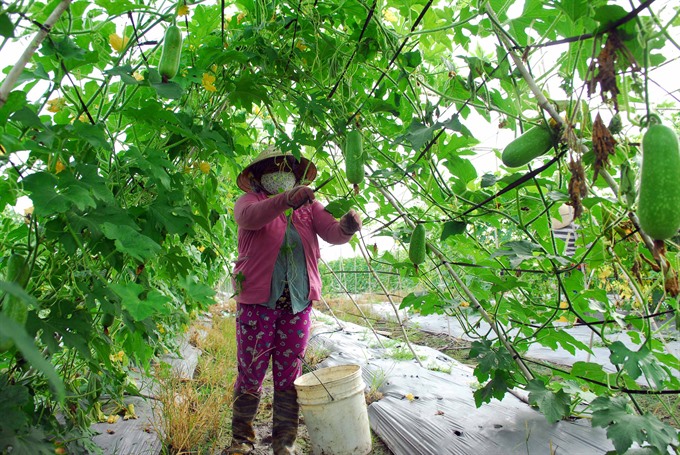 Politics & Law
Politics & Law

The National Assembly’s Standing Committee gathered Friday to review the draft Law on Crop Production which came under the spotlight over Government’s responsibility should planning fail and farmers become out of pocket.
 |
| A farmer tends to a long squash garden that complies with the Vietnamese Good Agricultural Practices (VietGAP) in Củ Chi District in HCM City. — VNA/VNS Photo Mạnh Linh |
HÀ NỘI — The National Assembly’s Standing Committee gathered Friday to review the draft Law on Crop Production which came under the spotlight over Government’s responsibility should planning fail and farmers become out of pocket.
The National Assembly (NA) Committee for Culture, Education, Youth, Adolescents and Children chairman Phan Thanh Bình said the draft law only regulated the role of municipal People’s Committee in carrying out the crop production strategy but not a word on what would happen if the residents cannot sell their abundant crops.
“This matter should be made clear. If there is a (crop) strategy and the People’s Committee is involved with it, there should also be subsidy policy so the Government can buy the extra yields when things go wrong,” he said.
The NA Committee for External Affairs chairman Nguyễn Văn Giàu, meanwhile, questioned the responsibility of the authorities in such a case.
“The draft law says any crop production must follow planning. So if a planning turns bad, who’s going to be responsible for it?” he asked.
Breeding policies in sync
Lawmakers on Friday also proposed new regulations to the draft breeding law outlining a national development strategy for the sector, a step up from the Government’s current incoherent breeding policies.
At the National Assembly’s Standing Committee (NASC), the new draft Law on Livestock Breeding was brought to the table for discussion.
The highest level of a legal document regarding the country’s breeding sector was the NASC’s Ordinance on Livestock Breeding issued in 2004, which dramatically changed the production and business of the sector, said the Agriculture and Rural Development minister Nguyễn Xuân Cường.
Meat production doubled from 2.5 million tonnes in 2005 to 5.4 million tonnes last year, while milk yield reached 800,000 tonnes in 2017, an eightfold increase from 100,000 tonnes in 2005.
The production model also gradually switched from scattered, small household business to industrial farm applying advanced breeding technology, the minister said.
“However, the sector still faces various challenges, especially when existing legal documents regulating the breeding sector is yet to cover all aspects of what is happening in real life while some regulations are no longer suitable,” he told the NASC.
“To address all the issues, the development and issuance of the Law on Breeding is of the utmost importance.”
While the NASC expressed unanimous support for the law, there were voices asking to clarify the role of the Government to orient the national breeding sector towards a modern and value chain-based one which also guarantees food safety and environment protection.
National Assembly deputy chairwoman Tòng Thị Phóng wanted the Ministry of Agriculture and Rural Development (MARD) – the one responsible for drafting the law to clearly identify and regulate the co-operation between MARD and other ministries in livestock management and promotion.
“(We should) have regulations to fix the inconsistency in breeding policies, from the production stage to the processing and consumption ones,” she said.
Some NASC members also demanded clarification in the law on breeding related activities invested and supported by the Government like setting up livestock disease-free zones and those to grow livestock fodder crops. — VNS




